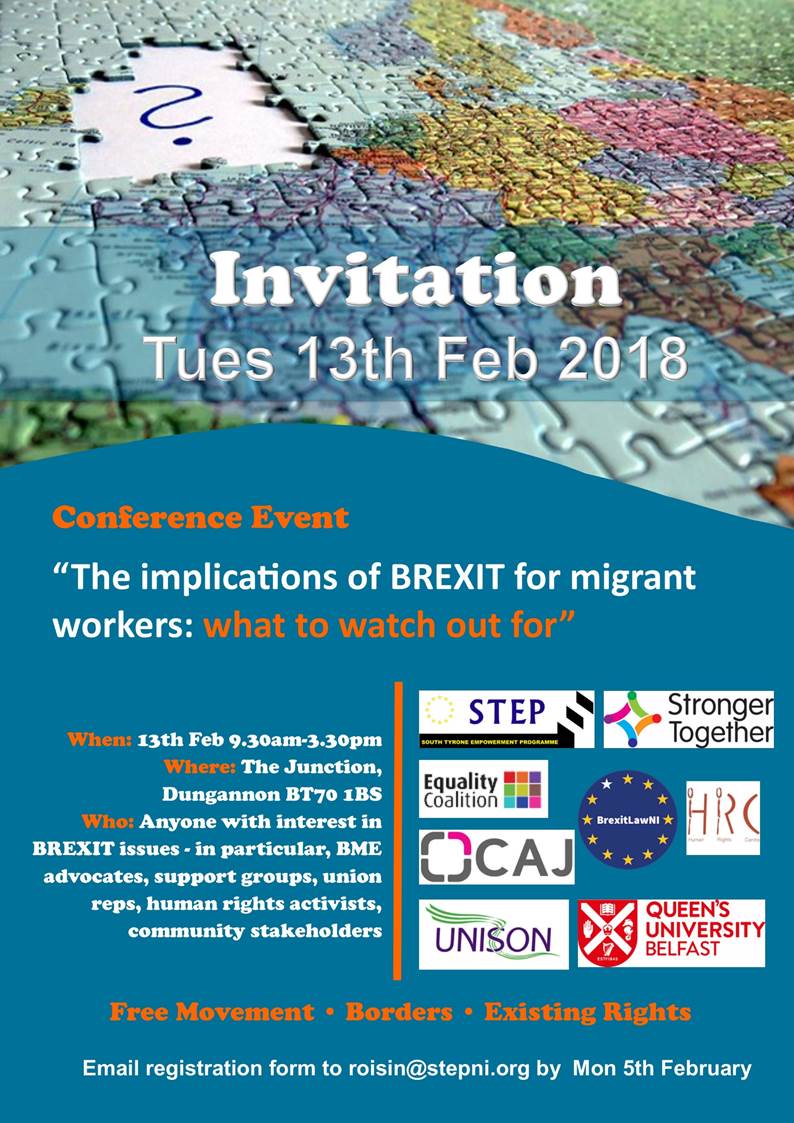Implications of Brexit for Northern Ireland: Have your Say!
The BrexitLawNI Project will be out and about around Northern Ireland to listen to the concerns of the general public about Brexit.

When it comes to looking at the implications of Brexit for Northern Ireland, the BrexitLawNI project has been out and about gathering information about the concerns of people living in Northern Ireland. Townhall-style events have taken place in Belfast, Derry and Enniskillen, with more events scheduled next month.
BrexitLawNI is a collaborative research project between the Law Schools at Queen’s University Belfast and Ulster University as well as the region’s leading human rights organisation, the Committee for the Administration of Justice (CAJ).
The project examines the constitutional, conflict transformation, human rights and equality consequences of Brexit, particularly looking at what Brexit will mean for Northern Ireland in terms of: the peace process; North-South relations; the border and free movement; xenophobia and racism; human rights and equality. The project also aims to disentangle the many complex questions that have arisen, including the significant legal and constitutional consequences that demand considered reflection.
Through their research, interviews with key stakeholders and public engagement activities, the project researchers hope to make an informed contribution to ongoing conversations about the implications of Brexit for Northern Ireland.
The project team has identified a number of key issues for Northern Ireland resulting from Brexit such as:
- All people living in the UK may have fewer human rights protections. Right now, the UK stands to lose the EU Charter of Fundamental Rights as well as access to the Court of Justice of the EU. This means that important rights, such as important workers’ rights, may be lost.
- Irish Citizens living in the UK may have fewer human rights protections. Many rights protections for Irish citizens living in the UK only exist because of their status as EU citizens and will no longer exist after Brexit. In particular, there are concerns about Irish citizen’s right to work, right to rent private accommodation, and to receive social security benefits.
- The specific impacts for rural and border communities in Northern Ireland. These impacts will also have particular knock-on effects for the socio-economic rights of the people in these areas. Some of the key concerns so far include the imposition of a border, negative impacts on the economy, impacts on cross-border workers, lack of access to migrant workers, and a lack of access to services such as healthcare and education.
- Northern Ireland might become one big border. Because Northern Ireland is the only part of the UK that shares a land border with an EU member state, it may become the most heavily immigration-policed region. In addition to policing by the UK Border Force and the PSNI, immigration enforcement may also legally be carried out by landlords, driving license agencies, banks and building societies, employers, and hospital staff. This means that people with very little oversight would be responsible for immigration policing. There are concerns about what this would mean for human rights and also there could be an increase in the use of racial profiling and discrimination.
So if you have something to add to the debate, why not come along to our next Townhall events. “The Implications of Brexit for Migrant Workers: What to watch out for” takes place on 13th February from 9.30am-3.30pm, in The Junction, Dungannon and will address the concerns of migrant communities in Northern Ireland. It is held in partnership with STEP, the Stronger Together Network and the Equality Coalition and will look at the disproportionate impact that Brexit is going to have on migrant workers from the EU and beyond.
The exact implications of Brexit are difficult to determine: precise government policy is yet to be decided in many areas and the positions and proposals set out to date can be subject to change. This event is interested in hearing how Brexit is already impacting on migrant worker communities in Northern Ireland and will share information as to what is known of governments’ intentions to date as well as being a listening exercise on current experiences, views and concerns on the implications for migrants in the future.
“BrexitLawNI Newry Townhall Meeting” will take place on 28th February from 7-9pm in the Canal Court Hotel where researchers from BrexitLawNI will break down some of the complicated issues into more accessible language and will outline some of their key concerns. Participants are invited to share their views and concerns on how Brexit has or will affect them and to ask their burning Brexit questions such as Brexit will affect Northern Ireland more than anywhere else in the UK so what do you want Brexit to look like? This event is open to all members of the public to allow for as many voices as possible.
Click on BrexitLawNI for further information on the project, or email brexitlawni@qub.ac.uk or follow the project on Twitter @BrexitLawNI.




